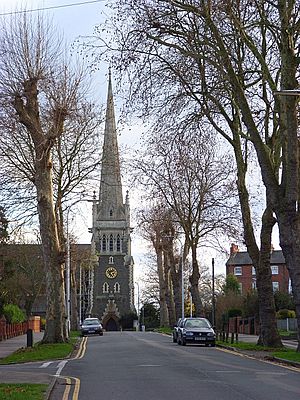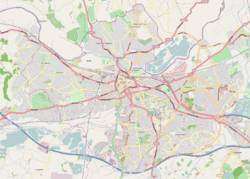Christ Church, Reading facts for kids
Quick facts for kids Christ Church |
|
|---|---|

Christ Church, viewed from Kendrick Road
|
|
| 51°26′38.400″N 0°57′44.474″W / 51.44400000°N 0.96235389°W | |
| Location | Reading |
| Country | England |
| Denomination | Church of England |
| History | |
| Consecrated | 7 August 1862 |
| Architecture | |
| Functional status | Active |
| Heritage designation | Grade II* |
| Style | High Victorian |
| Administration | |
| Archdeaconry | Berkshire |
| Diocese | Oxford |
Christ Church is a beautiful old church located in the town of Reading, England. It is a Church of England parish church, which means it serves the local community in its area. The church stands at the corner of Christchurch Road and Kendrick Road. Its tall tower and spire are a famous sight, especially when you look up Kendrick Road. Christ Church is a great example of the High Victorian architectural style. It is also a Grade II* listed building, meaning it is a very important historic building protected by law.
History of Christ Church
The construction of Christ Church took place between 1861 and 1862. The architect who designed this impressive building was Henry Woodyer. The church was officially opened and blessed on August 7, 1862.
Originally, Christ Church was planned as a smaller church to help out St Giles' Church nearby. However, it soon became clear that more space was needed. In 1874, the church was made much larger. This expansion included adding the tall tower, the spire, a south aisle (a side section of the church), and vestries (rooms used by the clergy).
What Makes Christ Church Special?
Christ Church is known for its High Victorian style. This architectural style was popular during the reign of Queen Victoria (1837-1901). Buildings in this style often have strong, bold designs, detailed decorations, and use different colours of brick or stone.
Being a Grade II* listed building means Christ Church is considered to be of special national importance. It is protected because of its unique architecture and its place in history. This protection helps to make sure the church is preserved for future generations to enjoy.
Find Out More
- Christ Church official website: http://www.christchurchreading.org.uk/


